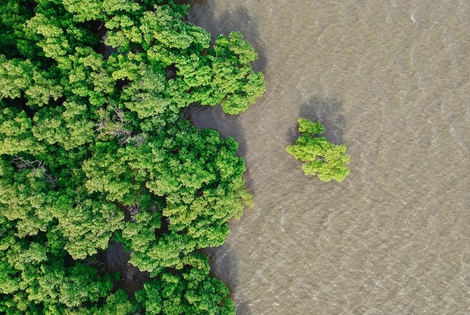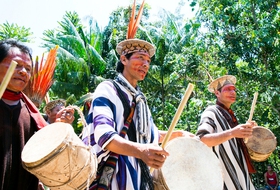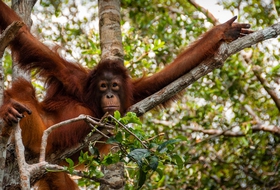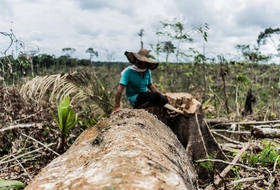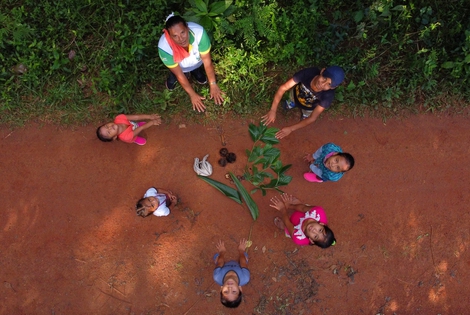
The Amazon became an alternative classroom during the pandemic. Now, the educational forest in Batraja, Bolivia, lives on to teach children and adults the value of nature.
A woman bought a rare turtle at a market in the Malaysian Borneo to set it free.
It was in a market in the Malaysian Borneo, terrified and disoriented, out of its habitat, waiting to be cut in pieces and end in a soup. But it found freedom.
We are talking about an individual of Asian giant softshell turtle (Pelochelys cantorii) and its happy ending story. This large and bizarre turtle species, once spread in Asian rivers, is today on the brink of extinction, and classified as “endangered” by the IUCN Red List.
Since the Asian giant softshell turtle is considered a delicacy, it is illegally hunted to be eaten in soups.
And that was the sad fate of the turtle protagonist of our story. Fortunately, it has been noticed by a compassionate person, Serene Voo Nyuk Wei, who was strolling at the market of her city, Kota Kinabalu, capital of the Malaysian state of Sabah.
The woman has immediately decided to buy the turtle, paying it about 165 dollars, in order to set it free. “I love and respect all living creatures,” said Serene Voo Nyuk Wei. “I knew that buying that animal would encourage the trade, but I could not face the fact that this poor turtle was going to end in someone’s soup.”
The woman contacted Sabah’s Wildlife Rescue Unit (WRU), in order to carry out full medical check-up to evaluate the health condition of the turtle, and then set it free.
“It had a slight malformation on the carapace,” said Diana Ramirez, WRU’s assistant manager and a wildlife veterinarian. “But after a few days on observation and receiving vitamin supplements, we decided that it was a good candidate to be released back into the wild.”
The animal has been moved from the bustling metropolis of Kota Kinabalu to the quiet of the forests on the Kinabatangan River, and then freed into the wild in its element.
Asian turtles are mainly threatened by hunting and trade, as well as habitat loss due to deforestation, fires, and land converted into agricultural areas.
Despite the numerous threats and the dreadful conservation status, the Asian giant softshell turtle is still not protected in the Malaysian state of Sabah. Efforts to stop the slaughter of these ancient animals are fewer compared to those carried out to protect more charming species, such as tigers, rhinos, and orang-utans.
However, people like Serene Voo Nyuk Wei fortunately exist, and believe that a turtle should swim free in a river, rather than floating in a soup.
Siamo anche su WhatsApp. Segui il canale ufficiale LifeGate per restare aggiornata, aggiornato sulle ultime notizie e sulle nostre attività.
![]()
Quest'opera è distribuita con Licenza Creative Commons Attribuzione - Non commerciale - Non opere derivate 4.0 Internazionale.
The Amazon became an alternative classroom during the pandemic. Now, the educational forest in Batraja, Bolivia, lives on to teach children and adults the value of nature.
Our species took its first steps in a world covered in trees. Today, forests offer us sustenance, shelter, and clean the air that we breathe.
Bangladesh suffered widespread damage as a result of Cyclone Amphan. Yet the Sundarbans mangrove forest acted as a natural barrier protecting the country from further destruction, as it has done countless times before.
On top of a 2.4 million dollar compensation, the indigenous Ashaninka people will receive an official apology from the companies who deforested their lands in the 1980s.
The tapir was reintroduced into Brazil’s Atlantic Forest, the country’s most at-risk ecosystem. The species can play a key role in the forest’s recovery.
Forests are home to 80 per cent of the world’s terrestrial biodiversity. This year’s International Day of Forests highlights the urgent changes needed to save them.
After a legal battle that lasted two years, Indonesia’s Supreme Court has revoked the permit to mine for coal in the forests of South Kalimantan in Borneo.
The list of human and animal victims of the Australia wildfires keeps growing – one species might already have gone extinct – as the smoke even reaches South America.
Areas where the FARC guerrilla used to hold power in Colombia have faced record deforestation. Farmers cut down trees, burn land and plant grass for cows. Because, “what else can we do for a living here in the Colombian Amazon”? An intimate report from the heart of the felled forest in Caquetá.

